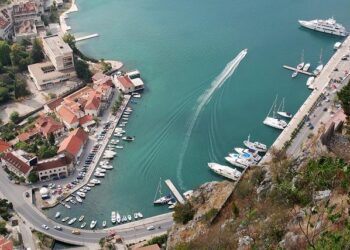Podgorica, Montenegro – In a decisive move to strengthen regional cooperation against transnational drug trafficking, the Organization for Security and Co-operation in Europe (OSCE) recently backed a high-level conference held in Montenegro. Bringing together law enforcement officials, policymakers, and international experts, the event focused on addressing the evolving challenges posed by cross-border drug crime and enhancing collective strategies to disrupt illicit networks across Southeast Europe. The OSCE’s active involvement underscores its commitment to fostering security and stability amid rising concerns over organized crime in the region.
OSCE Conference in Montenegro Focuses on Strengthening Regional Cooperation Against Transnational Drug Crime
Representatives from across the Western Balkans convened in Montenegro to address the escalating threat of transnational drug trafficking. The conference, backed by the OSCE, highlighted the importance of enhanced intelligence sharing, joint border management, and synchronized law enforcement efforts as critical components in curbing illicit drug flows. Speakers underscored the need to modernize investigative techniques and streamline legal frameworks to keep pace with evolving criminal networks operating across national boundaries.
Key outcomes emphasized during the event included:
- Establishment of cross-border communication channels to facilitate real-time information exchange
- Capacity-building workshops aimed at local agencies for drug interdiction
- A regional task force proposal to coordinate multi-jurisdictional operations
Participants agreed that sustained cooperation and political will are essential to dismantle trafficking routes and reduce the societal impact of drug-related crime in the region.
| Priority Area | Focus | Expected Impact |
|---|---|---|
| Information Sharing | Real-time exchange platform | Faster response to trafficking |
| Law Enforcement | Joint operations | Increased seizures |
| Legislation | Harmonized legal frameworks | Stronger prosecution |
Experts Highlight Emerging Challenges and Trends in Balkan Drug Trafficking Networks
Leading experts at the conference underscored the increasing complexity of drug trafficking operations in the Balkans, driven by evolving criminal methodologies and regional political dynamics. Key concerns include the sophisticated use of digital communication channels, which enable traffickers to coordinate activities with greater anonymity and speed. Additionally, shifting migration patterns across borders have inadvertently facilitated new smuggling routes, challenging existing law enforcement frameworks.
Panelists emphasized several critical trends reshaping the landscape of drug-related crime in the region:
- Enhanced cooperation among Balkan states to disrupt networks and share intelligence.
- Emergence of synthetic drugs as a preferred commodity, with significant increases in production and distribution.
- Exploitation of legal trade channels for narcotics concealment, complicating detection efforts at borders.
- Increased financial sophistication involving money laundering through legitimate businesses and cryptocurrencies.
| Challenge | Impact | Response Measures |
|---|---|---|
| Digital Encryption | Obstructs surveillance | Advanced cyber forensic tools |
| New Smuggling Routes | Increased border vulnerability | Enhanced regional border patrols |
| Synthetic Drug Surge | Health crisis escalation | Targeted public health campaigns |
| Money Laundering via Crypto | Obfuscates financial trails | Strengthened financial regulations |
Recommendations Emphasize Enhanced Intelligence Sharing and Capacity Building for Law Enforcement Agencies
Key resolutions from the conference underscore the urgent need to strengthen cross-border intelligence sharing mechanisms among law enforcement agencies. Enhanced collaboration is seen as vital to dismantling complex transnational drug trafficking networks that often exploit gaps between jurisdictions. Delegates advocated for the establishment of centralized databases and real-time information exchange platforms to facilitate swift, coordinated responses to emerging threats.
Equally critical is the emphasis on capacity building through targeted training and resource allocation. Recommendations call for comprehensive programs to equip officers with advanced investigative techniques, digital forensics skills, and an understanding of evolving criminal modalities. Participants highlighted the value of joint exercises and workshops to promote interoperability and foster trust among regional partners.
- Creation of integrated intelligence hubs for rapid data sharing
- Investment in modern technology for surveillance and analytics
- Regular joint training exercises to enhance operational readiness
- Strong legal frameworks supporting cross-border cooperation
| Priority Area | Focus | Expected Outcome |
|---|---|---|
| Intelligence Sharing | Real-time data exchange | Faster interdiction of drug shipments |
| Capacity Building | Specialized law enforcement training | Improved investigative outcomes |
| In Retrospect As the OSCE-supported conference in Montenegro concluded, participants underscored the importance of continued regional cooperation and information sharing to combat the evolving threats of transnational drug crime. With the region facing increasingly sophisticated trafficking networks, the Organization for Security and Co-operation in Europe remains committed to supporting Montenegro and its neighbors in strengthening law enforcement capacities and enhancing cross-border partnerships. The outcomes of this conference mark a crucial step toward a more coordinated and effective response to drug-related challenges in Southeast Europe. ADVERTISEMENT |
















